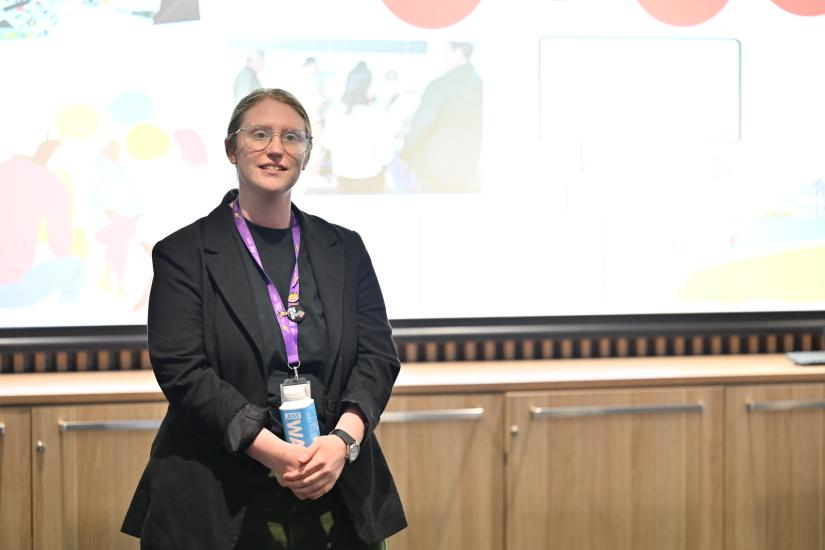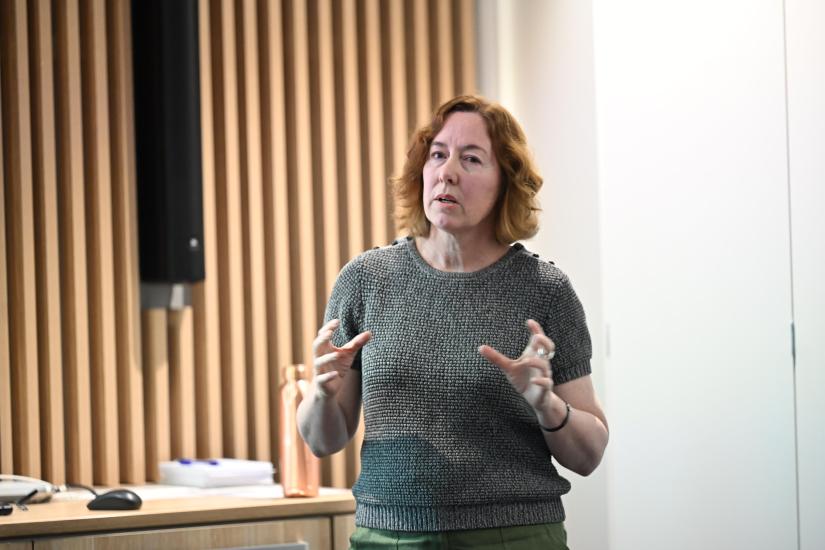Last week’s Research Cafe welcomed members of the Community Engagement and Impact Team from the UTS Centre for Social Justice and Inclusion and the editor of Gateways journal who shared how they are driving positive change through innovative research practices.
Knowledge exchange with the community at heart

Social Impact Practitioner Anusha Muller speaking at Research Cafe
Senior Social Impact Practitioner Amber Loomis and Social Impact Practitioner Anusha Muller spoke about how the team collaborates with communities, recognising them as experts in what UTS’ shared neighbourhoods need to thrive. They also presented ways you can share your own community-engaged work with academics, professional UTS staff and wider audiences.
Executive Editor Dr Margaret Malone then introduced Gateways: International Journal of Community Research and Engagement, a journal published by UTSC Press and co-sponsored by the University of North Carolina’s Urban Core. Gateways focuses on the communication and dissemination of community-university engaged research and practice.
Beyond our concrete tower

Amber introduced the Community Engaged Research Program, centring around the idea of knowledge exchange with communities at the heart. The team works with communities across Glebe, Pyrmont, Haymarket and Ultimo to understand what’s working and what can be leveraged to create change.
In 2022, the Centre for Social Justice and Inclusion created a community driven theory of change which has provided a framework for their priority areas. Participating community members identified housing, sustainability, inclusive, accessible spaces, transportation and community voice as priority areas.
When we think about research, we really want to expand traditional ways, move away from our traditional concrete tower of doing research and really making sure that we're generating knowledge with an impact.
The Centre’s work is driven by a Community Partners Group using strengths-based methodologies. It is also guided by Indigenous ways of knowing and doing.
“When we think about research, we really want to expand traditional ways, move away from our traditional concrete tower of doing research and really making sure that we're generating knowledge with an impact,” Amber said.
Get involved
As the team moves into a sustainability project, it is seeking collaborators passionate about sustainability and interested in learning more about working with communities. Interested?
Reach out to Amber to collaborate with the Centre for Social Justice and Inclusion and get involved in sustainability projects.
Apply for a Social Impact Grant
Anusha spoke about the upcoming Social Impact Grant Program that funds socially impactful research both on campus and outside in our communities. The grant worth up to $5,000 empowers researchers, practitioners, UTS staff and students to work with communities.
“UTS Social Impact Grants are intended to support community engaged research and the ethos of conducting research with communities rather than for them,” Anusha said.
The team invites applications from projects that promote a safe and inclusive campus at UTS with the aim of supporting the diverse staff and student community such as a project looking at culturally racialised or marginalised students on campus or supporting people with neurodivergent needs.
Another area of interest is thriving communities and applications that involve joint university and community partnerships. This can include any kind of social, environmental or health issue.
UTS Social Impact Grants are intended to support community engaged research and the ethos of conducting research with communities rather than for them.
The Social Impact Grants Program offers between $5,000 and $10,000 to cross-faculty collaborations. Applications are invited from all UTS staff members, students including professional staff, academics, undergraduate and postgraduate students.
Applications open 1st October 2024 and close at the end of November. Contact Anusha to learn more.
Discover Gateways journal

Gateways aims to bridge university research with community practice, serving as a platform for engaging with community-engaged research and promoting collaboration between universities and communities.
The growth and prosperity of the journal mirrors how community-university engaged research globally, locally, and regionally, has moved from being marginal to being absolutely core to what universities do these days.
Margaret highlighted its global reach and impact , with contributions from 35 different countries and a strong advisory board that includes Budd Hall, UNESCO’s Co-Chair for Community Based Research and Social Responsibility in Higher Education.
“The growth and prosperity of the journal mirrors how community-university engaged research globally, locally, and regionally, has moved from being marginal to being absolutely core to what universities do these days. Gateways is rigorous, it's collaborative, it's cutting edge, innovative and it's driving social and cognitive new knowledge, growth and change on the ground,” Margaret said.
Contact Margaret if you are interested in publishing in the Gateways journal or learning more.
Attend the UTS Community Engaged Symposium
Join the Community Engagement and Impact Team for a series of deep-diving panel sessions and interactive workshops designed to offer insights on community engagement best practices, build your knowledge and network with other practitioners.
When: Thursday 3rd October
- 12.30pm – 1pm: Engaged Teaching and Learning at UTS
- 2pm – 3.30pm: Beyond our concrete tower: Breaking down barriers between academia and community
- 2pm – 3.30pm: Indigenous Research: community-led, informed and actualised
- 2pm – 3.30pm: Evaluation with communities: who gets to decide what "good" looks like?
- 4pm – 6.30pm: From extraction to reciprocity: building authentic university and community partnerships
Where: UTS Central, Building 2, Levels 4 and 5